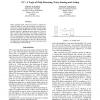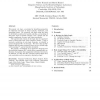1137 search results - page 96 / 228 » Knowledge Representation with Logic Programs |
149
Voted
CADE
2007
Springer
16 years 2 months ago
2007
Springer
We present a novel reasoning calculus for Description Logics (DLs)--knowledge representation formalisms with applications in areas such as the Semantic Web. In order to reduce the ...
118
click to vote
JOLLI
2007
15 years 2 months ago
2007
This paper presents an approach to artificial intelligence planning based on linear temporal logic (LTL). A simple and easy-to-use planning language is described, PDDL-K (Planning...
104
click to vote
AAAI
2007
15 years 4 months ago
2007
When reasoning about actions and sensors in realistic domains, the ability to cope with uncertainty often plays an essential role. Among the approaches dealing with uncertainty, t...
116
Voted
EXACT
2008
15 years 4 months ago
2008
The representation and manipulation of natural human understanding of temporal phenomena is a fundamental field of study in Computer Science, which aims both to emulate human think...
141
click to vote
CORR
2004
Springer
15 years 2 months ago
2004
Springer
We present role logic, a notation for describing properties of relational structures in shape analysis, databases, and knowledge bases. We construct role logic using the ideas of ...


